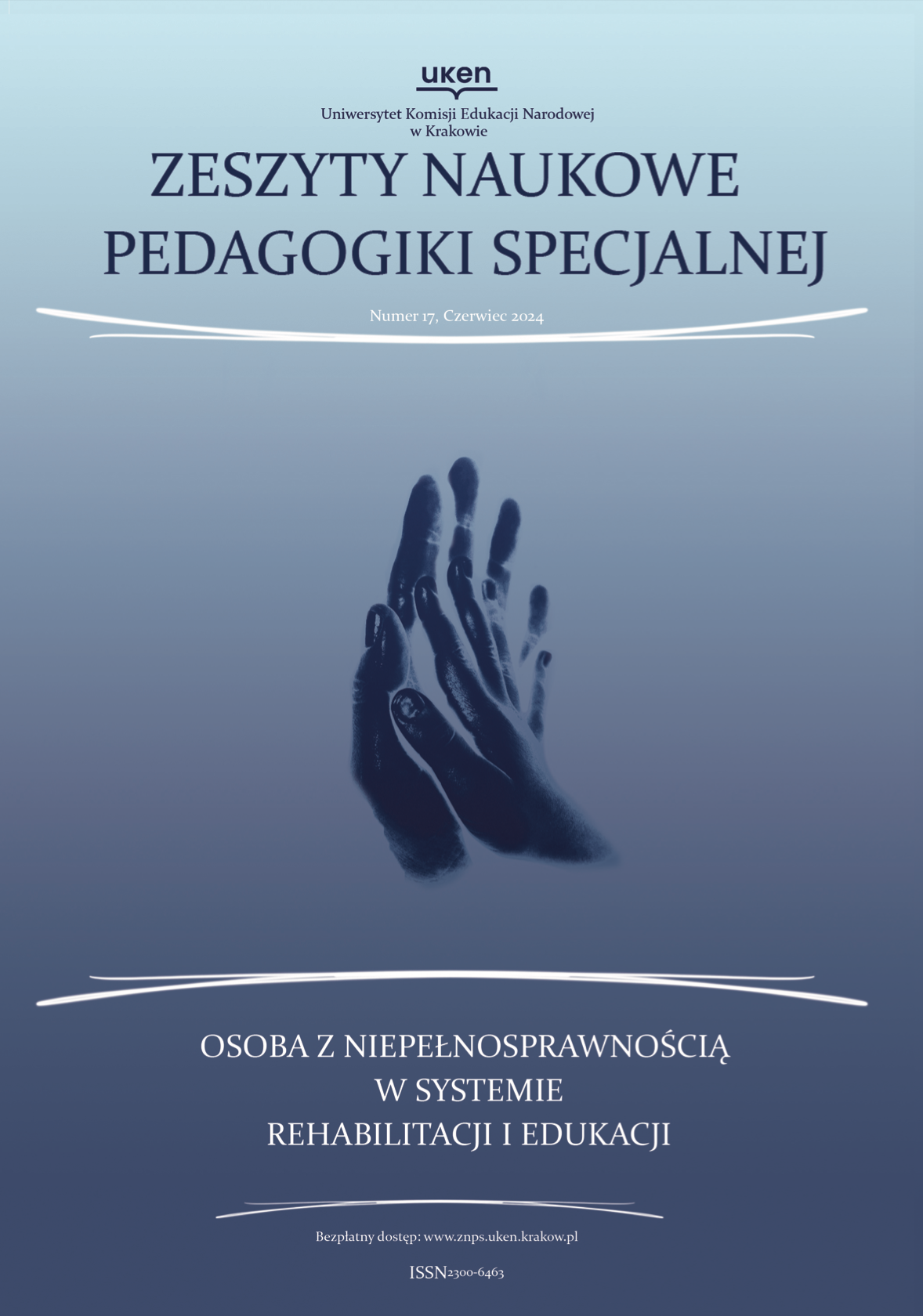Abstract
The aim of this article is to analyse the sexuality of people with intellectual disabilities and to present the principles of contemporary sex education in the Polish education system. The article will also focus on discussing the existing problems and challenges faced by the education system in Poland and consider potential modifications that could improve it. The analysis will be based on literature, international documents, legislation and research reports on the implementation of formal sex education in Poland and Sweden. The article will also take into account the social perspective in both countries, analysing attitudes, arguments and different perspectives of view. The article will also take into account the social perspective in both countries, analysing attitudes, arguments and different perspectives of view. Children and young people with intellectual disabilities have the right to fully develop their sexuality and their interest in this sphere of life is a natural part of their development. The current state of the Polish education system does not always provide sufficient knowledge on sexuality education for this group, which hinders the full development of their abilities and awareness in this area.
References
Dec-Pietrowska, J. (2023). Edukacja seksualna w Polsce i systemach edukacyjnych wybranych krajów–modelowe rozwiązania i międzynarodowe inicjatywy. Edukacja Międzykulturowa, 2(21), 69-82. https://doi.org/10.15804/em.2023.02.05
Dora, M. (2013). Lepiej nie mówić. o edukacji seksualnej w Polsce. Przegląd Pedagogiczny, 2, 101-107.
Fornalik, I. (2002). Rozwój psychoseksualny młodzieży z głębszą niepełnosprawnością intelektualną w zależności od środowiska życia. Poznań: Wydawnictwo UAM.
Gagnon, J., Simon, W. (2005). Sexual Conduct. The Social Sources of Human Sexuality, 2nd edn. Aldine Publishers Company.
Gajdzica, Z. (2007). Edukacyjne konteksty bezradności społecznej osób z lekkim upośledzeniem umysłowym. Katowice: Wydawnictwo Uniwersytetu Śląskiego
Gorajska, M., Kuik, M., Laube, J., Liszewska, U., Madej O. (2018). Edukacja seksualna w Polsce w kontekście promocji zdrowia seksualnego vs tabu seksualne. Psychoseksuologia, 4, 110-120.
Kamecka-Antczak, C., Szafrański M., Wos K. (2023). Wyzwania dla edukacji seksualnej uczniów z głębszą niepełnosprawnością intelektualną w Polsce. W: G. Całek, J. Niedbalski, M. Racław, M. Sałkowska, J. Sztobryn-Giercuszkiewicz, D. Żuchowska-Skiba (red.), Niepełnosprawność i edukacja. Łódź: Wydawnictwo Uniwersytetu Łódzkiego. https://doi.org/10.18778/8331-115-9.04
Kijak, R. (2011). Wstronę rozumienia seksualności osób z głębszą niepełnosprawnością intelektualną. Forum Oświatowe, 1(44), 137-151.
Löfgren-Mårtenson, L. (2009). Adapted Sex and Relationship Education. [ASS, Anpassad Sex och Samlevnadskunskap]. W: L. Löfgren-Mårtenson (red.), Hur gör man? Om sex- och samlevnadskunskap i särskolan. [How Do You Do it? On Sex and Relationship Education in the Special Education School]. Argument förlag, Varberg.
Löfgren-Mårtenson, L. (2012). “I want to do it right!” a pilot study of Swedish sex education and young people with intellectual disabilities. Sexuality and Disability, 30, 209-225.
Löfgren-Mårtenson, L., & Månsson, S. A. (2006). ” Sex överallt, typ?!” Om unga och pornografi. [Sex, like Everywhere?! On Youth and Pornography]. Gothia Förlag AB.
Rawińska, M., Terpiłowski, A. (2017). Seksualność osób z niepełnosprawnością intelektualną w opinii nauczycieli i terapeutów. Człowiek – Niepełnosprawność – Społeczeństwo, 2(36), 59-74.
Skolverket, (1999). Skolverkets nationella kvalitetsgranskningar. [The National Quality Review of the National Agency for Education]. Skolverket.
Stanisławski, P. (2004). Seks upośledzany. Integracja, 4, 14-18.
WHO (2010). Standardy edukacji seksualnej w Europie. Podstawowe zalecenia dla decydentów oraz specjalistów zajmujących się edukacją i zdrowiem. Lublin: Wydawnictwo Czelej Sp. z o.o


